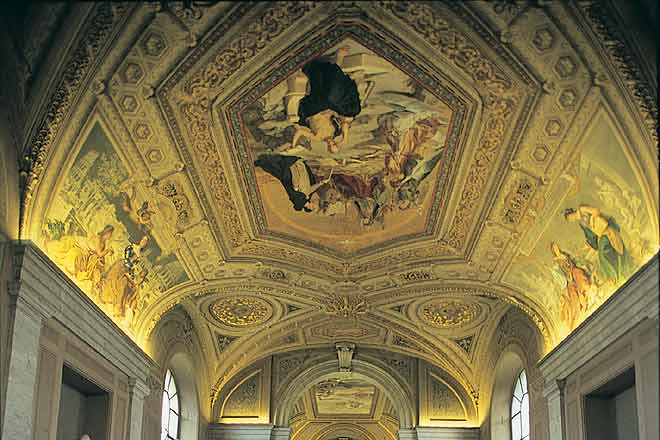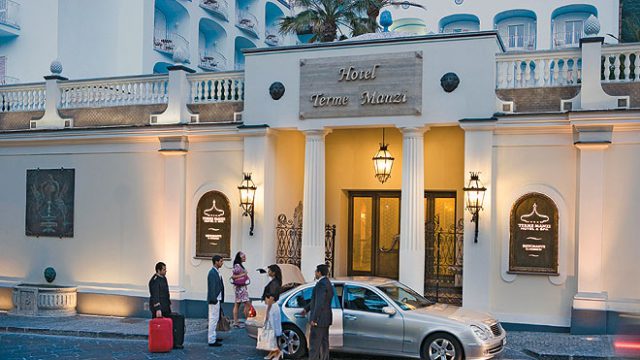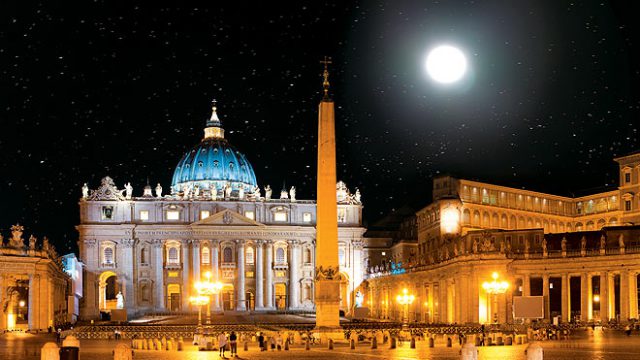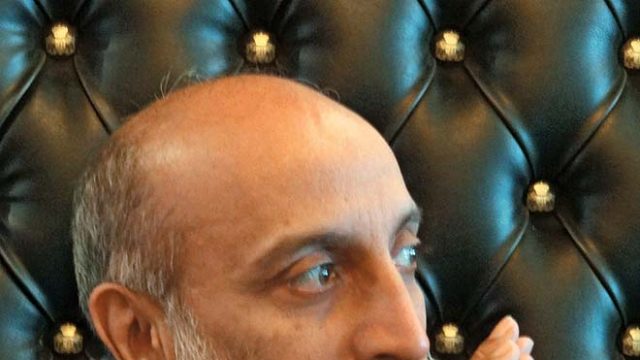Andrew is the first person to smile at me. He looks in very early middle age, and
This is fun. I’ve done careful research against babynames.com and matched all original names to closest-feeling fictitious ones to ensure full freedom and no offence while writing this story. This is important: through the week-long Globus’ Tour ZJW 1203 of ‘Italy’s Great Cities’, I find myself only as absorbed in Italy’s hundreds of heartbreaking works of staggering genius as I am with the people on the tour. It’s power without responsibility, making pseudo-psychological diagnoses of their characters Agatha Christie-style without the complications of a murder and the dreariness of figuring out how Mrs So-and-so was killed when the doors and windows were bolted from inside and the butler was standing guard outside for the previous 18 hours.
Anyhow, back to the room of so many tables and chairs. It’s the restaurant of the Albani Hotel in Rome, on the first day of our tour. There are 30 of us, and most have arrived that morning to be greeted by ‘tour director’ Elena Bartolo (real name of this superbly efficient person), with instructions to gather at 5pm in the restaurant. I wade through the sea of holidaymakers and tables at 5.04pm, and Sanjoy at an even more shameful 5.07; everyone else is seated. We get looks, superb Elena pulls out a smile.
She gives her speech — a lively, ever so gently things-work-differently-from-America-here speech. People shake hands tentatively and arrival stories are aired politely, which in my case is a strain — our luggage has gone missing. Then we head out for our ‘welcome dinner’ at a restaurant featuring indifferent wine, useless pasta, men with thinning hair singing sentimental songs in Italian — and I’m happy to be back in the small, 1970s-pink room of the Albani by 9pm.
Day 2: Rome
What a difference a night makes, even without clean clothes, and by 8am, we’re off for our first sightseeing in Italy. The morning tour will take in the Colosseum, the Roman Fora, and Vatican City. While the wheels of the well-oiled tour machine have been set in motion — Elena has retired to allow Stefano our local guide coordinate arrangements with the coach driver — the early morning rain has turned to sunshine. Everyone on the coach loves Stefano; he speaks near-flawless English, affects a comforting American accent, and does a fair job of explaining just why Rome wasn’t built in a day.
This early on a Sunday morning in December, there are few Romans to be seen in Rome. Our coach driver maneouvres the massive bus along the quiet streets, past famous sites with evocative names — Piazza del Popolo, Piazza di Spagna, Fontana di Trevi, Palazzo Venezia — and gently around the Colosseum. The Colosseum proves to be just as impressive when seen in real life. This is only the first of the trials that beset me on this tour — beating off the swarm of filmic images that rush in like fools. At the Fora I thought of Hampi, but all this banality of mind and spirit lasted only as long as it took to wait in a huge, snaking, semi-circular queue across St Peter’s Square in the Vatican, and finally enter St Peter’s Basilica.
The throngs magically melted away in the darkness of the great church’s interior. I gazed upon Bernini’s grand golden altarpiece; at pockets of stillness amid touristic fervour where worshippers sat in silence under altars; at the great enveloping dimness riddled with stray shafts of sunlight.
By 11.40, when I finally exited the cathedral, crowds were beginning to gather in the square. And on the balconies, in the narrow passages, on top of the cathedral steps — anywhere from where they could sight the Pope when he emerged at noon for his Sunday address to the public. At noon, as I was still struggling to find my way out of the thicket of eager human bodies, bells tolled and a tiny white figure appeared at a window (second from right on top floor). It boomed benedictions for all and, 10 minutes later, was gone.
Blessedly torn asunder from the crowds, I walked away in search of one of those fabulous cheap lunches that can be had in every Italian town — a sandwich (focaccia, pizza, calzone, whatever variety) filled with one of those glorious Italian cured meats and cheese, and a bottle of water — and settled down on a bench to further develop my character analysis of my tour group colleagues. I watched elderly, tireless Paul lend his elderly, elegant but tiring wife Marion an arm down the street. I wondered about very single Cassie as she looked uncertainly at sandwich displays. Youthful, motherly Liz came bouncing along telling her friendly, smart-alecky husband to quit making jokes at poker-faced Miriam, the tour’s other deeply single person. In dribs and drabs, we regroup, board the bus, and end the morning’s tour.
The rest of the day is an agony of waiting for Alitalia to turn half-way professional, slightly decent, tell us which part of the world our luggage has got held up, and return the wretched things to us. None of this occurs, which necessitates a horrifically expensive taxi ride to the airport where, outrageously, our luggage has been all along. By now we’ve missed the optional afternoon-evening walking tour of the Pantheon, the Spanish Steps, the Trevi Fountain, Piazza Navona. But at least we can gaze lovingly at our clean clothes.
Day 3: Rome-Pisa-Florence
By 7.30, we’re all showered, breakfasted, and in the coach. The reason for this early departure is apparent as we join the queue to enter the Vatican Museums. It’s a half-hour wait, at the end of which we’re one of the first groups in and I look back for the end of the line but can’t see it.
The Museums (yes, so large and so much as to warrant the plural) house staggering riches, collected by popes down the centuries. We walk dinner-plate-eyed down corridors of Egyptian antiquaries, Greek treasures, Roman relics, Renaissance masterpieces, overwhelmed and under-equipped to take in such magnificence. Down one such gilded corridor, and we arrive at what seems to me like one of the vital centres of human civilisation: the Sistine Chapel. It’s an ill-lit, diminutive, highly demanding space. First, the eyes must accustom themselves to the dimness; then they must look up; they must stay up; then the mind must be called upon to take in the incredible; and finally it can only boggle.
It’s just as well that we’ll spend the next hour or two in the coach. Gliding along the Aurelian Way, I doze off and wake only when we’re at Pisa.The famous architectural screw-up is now a sort of Disneyland of heritage sites. Wherever I look, I find grinning tourists posing for pictures sideways with arms up in the air. I feel like I don’t have time to waste on the Leaning Tower; unfortunately the coach will depart only an hour-and-a-half later.
At 6pm, when we finally roll out for another two-hour drive to Florence, Larry and Harry and Lucas and Paul are grumbling. And at past 8pm, when we’re checking in at the Jolly Hotel Firenze Carlton, tetchy Molly is demanding a room with twin beds not a double and Jackie wants a room with a bath not a shower. Superb Elena is having a hard time controlling her classically expressive Italian eyebrows and hands. A good dinner on Globus (meaning, it’s included in the tour cost) and a few bottles of Chianti do a good job before bed.
Day 4: Florence
At 9am, the Cathedral, the Duomo, Giotto’s Belltower, the Baptistry’s Gate of Paradise, Signoria Square, are all being spat upon by the skies. This disrespectful behaviour is shocking for us reverential visitors, plus it’s damp and cold and inconvenient. Which is why when Carlo, our guide in Florence, hustles us into the Academy of Fine Arts, we’re glad and quite eager to listen to him. Serious Carlo acknowledges our politeness by launching into the finest speech I’ve heard from a tourist guide. He walks us past giant unfinished sculptures by Michelangelo, all the while explaining, explaining, explaining, till we arrive at the colossal David. We spend a full half-hour studying David’s stance, the muscles on his thighs, his biceps, the position of the right hand, till Carlo finally runs out of good words. I notice Chrissie and mother and a few others getting restive; Carlo is clearly more moved by great art than he is by American tourists. And it strikes me that I’m on a really good tour.
There’s a sun, weak but brave, when we emerge and we walk around admiring the architectural marvels of this centre for Renaissance art. The rest of the morning is devoted to less high-minded but equally gratifying pursuits — checking out high-quality (expensive) Florentine leather goods; wandering around the fashionable district gaping at unaffordable goodies; watching the Americans part with their dollars gaily.
We have ‘free time’ till 6.30pm, when we will venture just out of Florence for what we’ve been promised will be a dinner “like a party”, three courses, wine, music. This is another ‘optional’, chosen because I am determined to eat at least one meal that’s unrelated to a sandwich, however heavenly. There’s enough time to return to the hotel, nap, and run out again for a long walk down the Arno River to the Uffizi Gallery. I’d sworn not to leave without paying a visit to the “most important museum of Renaissance art in Italy”. I didn’t, and nobody who visits Florence should either.
Dinner at a pretty country inn in the village of Impruneta is almost like a party. Smokers and friendly non-smokers hang out outside between bottle-openings; acquaintanceships are struck up and misconceptions cleared. A popular one, which raises many laughs, involves the (mis)understanding that Sanjoy and I are married to each other but fighting (“Gee, I thought you guys were having a last holiday before the divorce!” said Liz).
Day 5: Florence-Verona-Venice
This is doze-in-the-bus day. Wake-and-stare-out-at-Tuscany-in-December day. We’re on our way to Venice from Florence. On the way, we will stop for an hour or two in Verona. This proves to be just enough time to note that it’s a town full of elegant shops and endearing market squares, but in need of a slight slap on its pretty face. Verona’s biggest tourist attraction is a joke on naïve tourists — the ‘famed Juliet’s Balcony’. Elena admits that the balcony was built a few decades ago to please visitors. By 4pm, our coach has pulled into the main bus stand outside ‘La Serenissima’.
Day 6: Venice
To say that the city of canals is like a film set, that the eye has been here before, is to submit to a cliché. And perhaps it’s best to submit to Venice. There’s no way that one’s day-and-a-half here can conquer the abstraction that is Venice, the reflective beauty of centuries, nowadays constantly shrouded in the thick fabric of touristdom. So I board the gondola, bobbing threateningly at the pier outside our hotel, in what I consider is a gesture of graceful genuflection to the Venice One Sees.
The city is so inured to us that children don’t wave as we pass and the local women don’t look our way as they hang out their washing. “Don’t let the Venetians worry you,” superb Elena had said to us, “They’re not so friendly, they’re just different.”
Venice is different, that morning and again in the afternoon. The unfriendly, cold greyness of early morning has given way to a perky, sunny brightness while we are being dazzled at St Mark’s Square and inside the Doges’ Palace. We are allowed to enjoy the showmanship in a Murano glass-blowing factory and cruise out to Burano, the island where they make lace like embroidered glass in candy-coloured houses. We eat extremely fine seafood risotto that looks like oatmeal porridge.
I have the evening to myself. I venture out of our hotel, situated at one end of the Canal, forego the vaporettos, and cruise Venice’s tourist highway on foot — it doesn’t exist of course, it’s all in the eye, in the signs that point to ‘Rialto’ (and onto San Marco) when you walk in one direction and to ‘Ferrovia’ (to the train station) when you walk in the other. I walk from one narrow alley over another bridge, turn a corner almost intuitively, feel lost now and then, and somehow never am.
Day 7: Venice-Rome
Early morning, good morning to Larry and Harry, Lucas and Paul, get in the coach. Venice is again a film, one I watched yesterday. By evening, we’re in real life — lovely, noisy, screechy Rome.
The information
The tour: We travelled on Globus’ 7-night tour of ‘Italy’s Great Cities’. The tour begins and ends in Rome, and features two nights each in Rome, Florence and Venice, with stops in Pisa and Verona. Travel between cities is in a capacious air-conditioned coach.
Sightseeing: The group is ready and out of the hotel by 8am. Grim? Remember this is what gives the group first crack at sites like the Colosseum, where an hour’s delay means huge crowds and long queues. There’s a different local guide in each city, all excellent. We listened to them with an innovation that involved wearing a earpiece and the guide talking into a small mike (allows you to wander off a bit but still stay connected to the group). Mornings/afternoons go in sightseeing; the rest of the day, do your own thing or join the group again for an optional tour.
Meals: Breakfast is served daily; lunch never; and dinners, in our case, twice. These were served on days we were arriving tired from another city; other days we were on our own. But there’s almost always an optional tour that throws in dinner as well.
Hotels: Globus groups stay in ‘first-class’ hotels. In Rome, we stayed at the Albani Hotel (compact, retro-chic, excellent service); in Florence at the Jolly Hotel Firenze Carlton (a 15-minute walk away from the main action); and in Venice at the Carlton & Grand Canal (heritage hotel).
Contact
Globus tours are sold at all major travel agents. For brochures and queries, write to gdsouza@globus andcosmos.com or visit www.globusandcosmos.com
Italian job
Italy
Pisa





